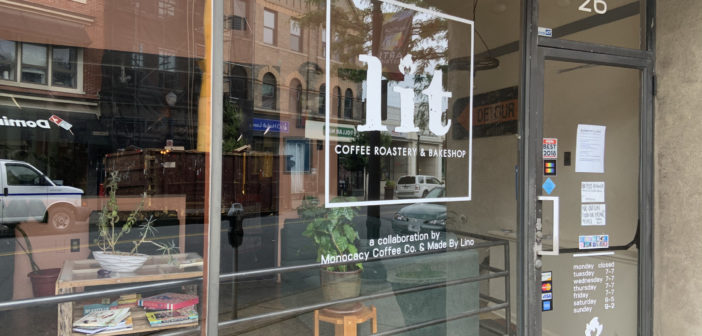Having to close their doors was hard, but reopening may be harder.
Small business owners are focused on reopening their stores and restaurants, while prioritizing public health, as the Lehigh Valley is one week into the yellow phase in Gov. Tom Wolf’s plan regarding the COVID-19 pandemic.
Neville Gardner, owner of McCarthy’s Red Stag Pub & Whiskey Bar, said he has to expand his operational footprint in order to reopen safely. Gardner said the establishment had been restricted to takeout orders to abide by the Centers for Disease Control and Prevention (CDC) guidelines.
During the shutdown, Gardner had to reinvent his business, while aiming to keep the management and a couple of his full-time kitchen staff members working.
The kitchen still turned out McCarthy’s signature Celtic fare, but they started delivering via GrubHub. Their long-standing cooking classes thrived online, with eager home cooks tuning into the kitchen’s demonstrations via Zoom.
“It’s basically not a huge revenue generator,” Gardner said. “But it’s a very positive thing for helping build a business and connect with customers.”
He had said he hoped to have at least a fraction of his establishment available once the yellow phase began.
McCarthy’s reopening plans include seating 40 to 50 customers, along with nine tables on their outdoor patio, with social distancing guidelines in place. This is as a result of the closure of Walnut Street to allow for more outdoor seating capacity.
“Nothing would be worse than another spike of infections,” Gardner said.
The city of Bethlehem started allowing street closures for business to use on June 4, which will last indefinitely.
The yellow phase underlines the chasm between those who hope to reclaim normalcy and those who remain tentative when red flags are flying. To the latter, reopening is a grim reality rather than an opportunity.
Matt Hengeveld and Dan Taylor, co-owners of Monocacy Coffee Co., are fearful that reopening too soon could lead to a spike in cases and trigger another round of shutdowns — especially without the presence of mass testing and contact tracing. The Monocacy Coffee Co. includes Lit Coffee Roastery & Bakeshop in Bethlehem, and Cosmic Cup in Easton.
Hengeveld and Taylor said while the espresso machines are ready, they want to ensure the safety and well-being of their employees and customers.
“We do need at some point to continue operating to earn enough of a living to survive,” Hengeveld said. “But the truth is that we can follow every protocol and put in every safety measure, and there will still be a pinhole of vulnerability that one can spread this virus.”
On May 19, Pennsylvania allowed the real estate industry to conduct limited business-related activities.
Justin Torok, vice president of HomeSpot Media, knew it wasn’t going to be business as usual when he reopened.
His reopening plan involved lots of masks, gloves and shoe covers. He settled down to a routine of health screening, sanitizing equipment and cleaning in the office.
Time spent on the property is minimized between Torok and his four co-workers by having prior discussions with clients remotely.
“According to the Pennsylvania Association of Realtors, no more than three people are allowed on a property at any given time,” Torok said. “It’s either two homeowners and me or a homeowner, a realtor and me.”
All nonessential businesses had to close their doors when Lehigh and Northampton counties assumed the statewide shutdown on March 25.
Even though revenues were down 88 percent in April from the year before, Gardner managed to sustain McCarthy’s with financial assistance from the Paycheck Protection Program, which helps fund rent, utilities and payroll.
Hengeveld, who had no choice but to lay off his staff, said it’s unclear when the two cafes will be able to reopen, so many employees are better off turning to state unemployment benefits — with an extra $600 a week injected by the federal government’s $2 trillion CARES Act package.
Without staff, Hengeveld had to forgo the PPP loans, which will only be fully forgiven if at least 75 percent have been used for payroll. He faced a quandary, knowing small businesses must jump through countless hoops just to stay open.
“We started Monancy from our basements, so we were used to running very small businesses at one point in the past,” Hengeveld said. “I can’t say we’re making money right now, but we’re not bleeding out either.”
Monocacy fell back on online sales, roasting coffee for other businesses and the fact that their rents in Bethlehem and Easton were reduced after coming to agreements with both landlords.
Hengeveld said he is optimistic about Monocacy Coffee Co.’s transition into the yellow phase, while remaining cautious of the threats of the virus and limitations the business will continue to face.






Comment policy
Comments posted to The Brown and White website are reviewed by a moderator before being approved. Incendiary speech or harassing language, including comments targeted at individuals, may be deemed unacceptable and not published. Spam and other soliciting will also be declined.
The Brown and White also reserves the right to not publish entirely anonymous comments.